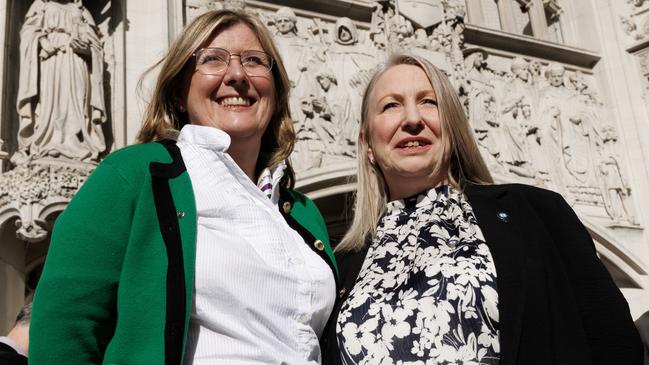Organisations ‘must revisit policies’ after Supreme Court trans ruling
A judgment that the legal definition of a woman is based on biological sex means hospitals, prisons and businesses will have to review their guidelines.

Every organisation in Britain has been told to revisit its equality policies after the country’s highest court ruled that trans women were not legally women.
Women’s rights campaigners celebrated the Supreme Court’s declaration yesterday (Wednesday) that the definition of a woman in the Equality Act was based on biological sex, ending years of confusion.
Campaigners said organisations that had allowed biological men into women’s spaces must immediately scrap the policies or face legal action.
All organisations, including hospitals, prisons and businesses, will have to review their policies. The ruling means they will have legal backing to protect single-sex spaces such as changing rooms, lavatories and women’s shelters on the basis of biological sex.
The government will also come under pressure to repeal the Gender Recognition Act, which allows people to obtain a gender-recognition certificate, after the “watershed” judgment rendered it “effectively defunct”.
The ruling marked the end of a long legal battle between the gender-critical feminist organisation For Women Scotland and the Scottish government about the definition of a woman.

It also ended confusion over the Equality Act, which has been increasingly interpreted to allow sex-based rights to be granted to trans people who hold a gender-recognition certificate (GRC) that legally changed their sex.
However, the five judges said the ruling did not diminish trans women’s protection against discrimination.
The Equalities and Human Rights Commission, the equality watchdog, will urgently update its guidance to organisations, and ministers are under pressure to set out what the decision will mean.
Baroness Falkner of Margravine, who chairs the watchdog, said the result of the ruling “cannot be overstated” and that her organisation would review its guidelines as a matter of urgency to reflect the clarity provided by the court.
Sex Matters, the women’s rights charity, said the ruling meant sports bodies had “no excuses” for continuing to allow transgender women to compete in female categories.
NHS officials have confirmed they will consider the ruling when they update guidance on same-sex hospital wards while Ministry of Justice sources said officials were considering the implications of the ruling on their policies.

Marion Calder, a director of For Women Scotland, said: “If there is a female sign on the door, that is now a single-sex space. That is crystal clear as a result of today’s ruling, GRC or not. The many bodies which are operating self-ID policies must immediately scrap them. They are now illegal. If they do not, they will see multiple tribunals very quickly.”
JK Rowling, the Harry Potter author who had funded part of the case, paid tribute to the “extraordinary, tenacious” campaigners behind the legal challenge, writing on X that their efforts had protected the rights of women and girls across the UK.
A person wanting to change their sex on their birth certificate will still be able to do so by obtaining a GRC, but the court made clear that this would not grant them sex-based rights except in respect of marriage, pensions, births and deaths.

Labour had previously promised to make the gender recognition process easier but The Times revealed this year that those plans had been shelved.
A party source said Sir Keir Starmer had adopted a “common sense position” that was shared by the public on protecting women’s spaces. The source said: “He gradually moved the party from one that took the activist position to a serious, sensible one that protected women’s spaces while allowing for respectful debate.”
Bridget Phillipson, the women and equalities minister, said: “We have always supported the protection of single-sex spaces based on biological sex. This ruling brings clarity and confidence, for women and service providers such as hospitals, refuges and sports clubs.”
However, Rosie Duffield, the former Labour MP who quit the party over its position on gender and sex, told Times Radio that the government was “gaslighting” and that some women in the party had paid a heavy price for expressing their views.

Gender-critical campaigners gathered outside court to celebrate the outcome. Carrying banners bearing the dictionary definition of woman, “adult human female”, they sang: “Women’s rights are human rights.” In a jubilant atmosphere, glasses of champagne were passed around as many supporters became tearful.
Stonewall, the LGBT charity, said there was deep concern about the consequences of the ruling, which it said were “incredibly worrying for the trans community”.
Scottish ministers had argued that transgender women with a GRC were entitled to the same sex-based protections as biological women, while For Women Scotland said they applied only to people who were born female.
The Scottish government said it accepted the ruling and would not seek to bring a new case that could have ended up in the European Court of Human Rights, which would have been its last remaining recourse.
The Times



To join the conversation, please log in. Don't have an account? Register
Join the conversation, you are commenting as Logout